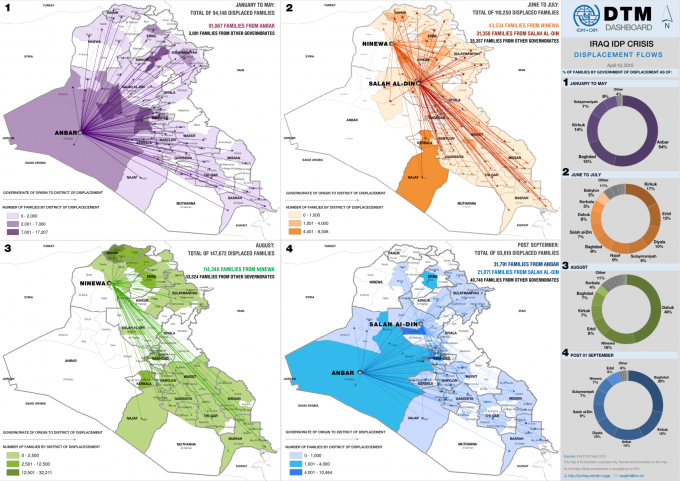Displaced people going back to Kurdistan Region camps

08/03/2019
Thousands of internally displaced persons (IDPs) have returned to the Kurdistan Region after first going back to their homes elsewhere in Iraq this year amidst poor living conditions and security in their areas.
A Kurdistan Regional Government (KRG) official said the IDPs do not feel they can live safely and comfortability due to the Islamic State (ISIS)’s continued presence and poor services.
"The return of IDPs [to camps in the Kurdistan Region] this year has increased considerably,” KRG Ministry of Interior official Hoshang Mohammed told kurdish media Rudaw. "Return of the IDPs from the camps to their homes have considerably stopped due to lack of services...especially due to the uptick of ISIS activities.”
There are 770,000 IDPs in the Kurdistan Region, according to Mohammed, who is the director general of the ministry’s Joint Crisis Coordination Center.
Including refugees from Syria, Iran, Turkey and elsewhere, there are 1,100,000 displaced people, with 60% being from Nineveh, Mohammed said. There are 29 IDP and refugee camps in the Kurdistan Region, according to Ministry of Interior figures.
The issues recent returnees face are especially apparent in Mosul, according to Mohammed.
“As of now, more than 6,000 IDPs of Mosul have returned to the camps in Kurdistan Region,” he said.
Iraq recaptured Mosul and its surrounding areas in the Nineveh province from ISIS in June 2017 after a lengthy campaign involving Iraqi security forces, the Kurdish Peshmerga and the US-led anti-ISIS international coalition.
Much of Mosul remains in ruins, however, due to a slow rebuilding process. ISIS and unknown groups still carry out attacks in the Nineveh province.
Lack of jobs is another reason some returnees are coming back to the camps.
"Those who have returned [to the camps] have mainly returned, first, due to lack of security and second due to lack of jobs," said Mohammed. "When they returned, there is no support for them to start again, to go back to a normal life.”
The policy of the Ministry of Interior is that no IDP or refugee will be sent back against their will, and all return is a personal choice, according to Mohammed.
Noura Mohammed is one of the two-time IDPs. She fled ISIS in Mosul, but returned to her city in 2018. She then came back to the Hassan Sham camp east of Mosul in the Kurdistan Region in the last week.
“There was no security, life, or food. We returned to camps,” she told local media.
Mohammed, a mother of four, said the camp provides a better life, despite it being a collection of tents.
"I said the camp would be better, even though it is smaller,” she said, adding that her husband has been missing since the battle. “There is security and assistance here.”
Khalaf al-Rafai, another Mosul native, also returned to the camps with his family of nine this year.
“There is no life, school for my children, nor are there job opportunities for me," Rafai told Kurdish media outlets
Rafai has returned to the camp mainly for his children to receive education and for NGOs to help him, according to him.
The return of IDPs is a priority for the federal Iraqi government. The Ministry of Migrants and the Displaced announced a 1.5 million IQD (around $1,200 USD) grant per family 12,000 IDPs who have returned home.
In a July 20 meeting between the ministry head Nawfal Baha Mousa and UN delegations, Mousa said Iraq needs more international support for its displaced.
"The ministry is waiting from the international community bigger steps in making moves to help the ministry to minimize the challenges that IDPs face and to encourage them to return,” said Mousa. “The Iraqi government supports voluntary, not forceful, return.”